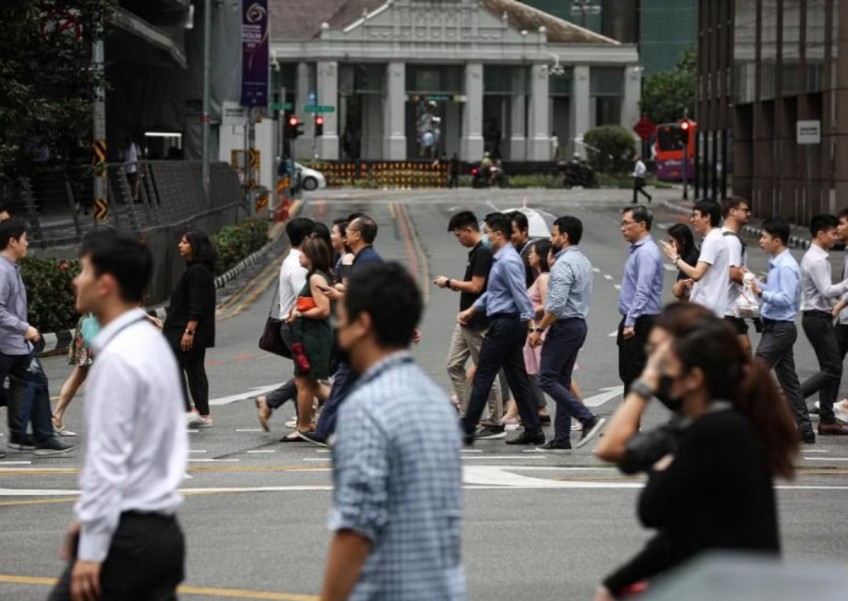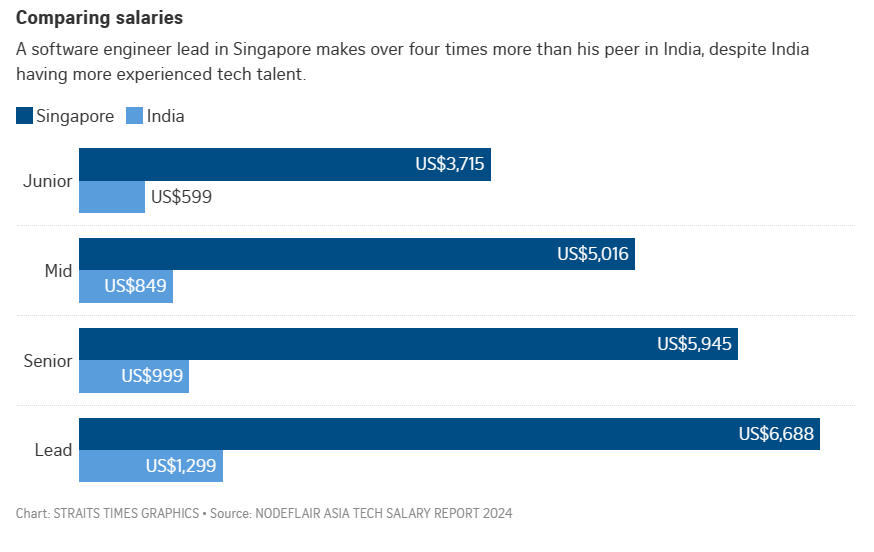Data scientists experience largest pay growth among tech professionals, says study


SINGAPORE — Software engineers have long been among the most highly paid tech professionals, but in Singapore, they are being overtaken by those working in artificial intelligence (AI) and cyber security.
The pay of software engineers dipped 0.99 per cent in 2023 compared with an 11.3 per cent surge for data scientists and an 8.24 per cent rise for cyber-security engineers, noted tech talent platform NodeFlair.
A chill in the metaverse world, a crypto winter and tech firms cutting hires enrolled during the Covid-19 pandemic have cast a cold spell over the tech sector, worsened by a drought in start-up funding in South-east Asia.
The implosion of crypto exchanges FTX and Binance, for instance, sent salaries for blockchain engineers tumbling 5.41 per cent in 2023, the firm said in its annual Asia Tech Salary Report released on April 8.
"In contrast to the preceding two years, during which technology salaries experienced substantial growth, there is now an overall decrease in salaries for various tech positions," the firm wrote.
But it did note that salaries are still higher compared with 2021.
Software engineers — front-end, back-end and full-stack engineers in NodeFlair's count — brought home median base salaries of $5,000 a month as juniors in 2023 and $11,000 as managers here.
Those salaries suggest that they make more than their peers in other industries.
A survey out in February noted that local graduates in the information and digital technology fields made the highest gross monthly pay at $5,500, although that was down from $5,625 in 2022.
Engineering graduates made $4,500, arts, design and media graduates collected $3,740 and business grads made $4,150.
Still, software engineers, headhunted worldwide during the pandemic as digital services exploded, now face a future where generative AI (gen AI) writes code, faster and with fewer errors.
In contrast, specialists in gen AI or cyber security, more critical now in the light of auto-generated threats, are in hot demand.
Data scientists, who edged out software engineers with the biggest wage growth in NodeFlair's report, include positions such as AI engineers, machine-learning specialists, deep-learning experts, natural language processing practitioners and computer-vision specialists.
NodeFlair co-founder Adrian Goh expects the next-in-demand skills to be cloud computing and data engineering - both essential for AI to work.

Cyber-security expertise will rise in demand as well.
"They play a critical role in detecting and responding to cyber threats targeting AI infrastructure, including servers, networks and cloud platforms," Goh said.
"As large language models advance, they've demonstrated the ability to solve complex challenges such as captchas, once considered exclusive to human cognition."
Captchas are tests such as the identification of distorted letters and numbers to authenticate humans from bots.

The first batch of workers to help firms use gen AI at scale in 2024 might still be programmers and developers.
Goh said: "In the short term, the supply of AI talent in Singapore is likely to come from engineers who are willing to acquire AI skills, driven by both personal interest and the potential for financial gains."
That was what happened when blockchain was hyped up a few years back, he added, noting that "general" software engineers transitioned into blockchain development roles.
Graduates and mid-career workers trained in AI will gradually make up the numbers, he said.
Besides using AI in hiring workflows, NodeFlair expects companies to do more cross-border and remote hiring in 2024. The firm opened an office in Vietnam in 2023 to meet those demands.
Charles Ferguson of employer-of-record firm G-P said remote, global hiring is necessary in Singapore's tight labour market.
The general manager of G-P's Asia-Pacific office said: "The challenge mirrors global trends — skills gaps can be bridged effectively only by looking for talent beyond our borders."
Despite the NodeFlair report showing that Singapore software engineers could cost four times more than their counterparts in India, where there are also more experienced and senior engineers, Ferguson said local workers are competitive and likely to remain so with strong government support for AI training.
"For example, a recent report by LinkedIn found that workers in Singapore are the fastest adopters of AI skills in the world," he said.
"In fact, G-P found that more than 91 per cent of Indian employees are reluctant to use AI at work, compared with only 77 per cent of Singaporean employees."
Ferguson added that with 59 per cent of global technology firms' regional bases here, local employees facilitate operational planning. But deriving the most value from talent means thinking and hiring globally, he added.
"When tech talent in Singapore, India and around the world work together, businesses get to unlock their maximum potential."
Amid the upheavals, job seekers are prioritising companies that provide stability.
Goh's founding partner, NodeFlair chief executive Ethan Ang, said workers are now drawn to firms that not only offer competitive salaries, but are also financially stable and committed to avoiding layoffs.
Salary has also won over priorities of previous years — such as work-life balance and employee benefits.
"Technical professionals are also increasingly open to accepting a company culture that may not be perfect, as long as their salary aligns with their expectations," Ang said.
ALSO READ: Median monthly household income in Singapore above $10k in 2023, up 2.8% in real terms
This article was first published in The Straits Times. Permission required for reproduction.